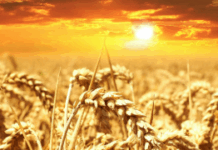As reported in The Hutchinson News: MANHATTAN — Climate change conjures notions of rising water levels along the coasts, severe drought in the Intermountain West and the record temperatures baking the Pacific Northwest this week.
Add to that toasty Kansas evenings.
New research from Kansas State University shows that rising overnight temperatures hurt wheat harvests. Rice, corn and barley all face similar problems.
While researchers also look into finding more resilient varieties of those crops to account for the change, the immediate climate trends could have a dramatic impact.
Quality, quantity of wheat will go down.
In trials of some of the most popular varieties of wheat grown in Kansas, K-State and North Carolina State University researchers found that an increase of only 1.8 degrees Fahrenheit in overnight temperatures caused a 5% reduction in wheat yield.
“Most people think plants aren’t dynamic, but they are,” said Colleen Doherty, an associate professor of biochemistry at North Carolina State University. “Plants are constantly regulating their biological processes — gearing up for photosynthesis just before dawn, winding that down in the late afternoon, determining precisely how and where to burn their energy resources.”
She said their experiments showed that hotter overnight temperatures confuse the plant’s internal clock. With a screwed-up clock, the plant has a harder time turning the sugars produced during photosynthesis in the day into plant growth.
“The amount of wheat that you’ll get will go down, but also the quality of wheat will go down,” said K-State crop physiologist Krishna Jagadish. “So your bread probably may start to taste a little bit different in the future.”
Summer nights are getting hotter.
Average summer nighttime temperatures have been increasing across the state. Since 1970, the average low in the Wichita area has increased 2.7 degrees. In Topeka, it increased 3.5 degrees.
At the same time, the average summer high temperature only increased 1.4 degrees in Wichita and 2.8 degrees in Topeka.
Jagadish said it’s harder for people to notice these changes when the average temperature is increasing more during the night than it is in the day. But researchers, like him, are beginning to look more into the issue and to provide information that reveals the true extent of the dangers.
Kansas seeing change in rainfall, freezes.
Rising overnight temperatures aren’t the only negative impacts from climate change that Kansans can expect to experience. Assistant state climatologist Mary Knapp says we’re already seeing changes in precipitation patterns.
“We’re getting more rain, but it may not be distributed as evenly as needed,” she said.
That means some places are going from very dry to getting the expected monthly rain total in a single day. That won’t show up in long-term averages, but has real consequences.
“You’ve got more of it running off,” she said. “You’ve got more erosion issues and you’ve got more flooding issues.”
Knapp also said Kansas winters are getting milder. She said the state will still experience its typical spring freezes in March and April, but milder Decembers and Januarys will confuse trees and plants, making them less resilient to those freezes.
Some grains more adaptive to heat.
It’s not all doom and gloom from the wheat research. There’s already evidence that some varieties of wheat are more resilient to temperature increases in both the day and the night. Jagadish said once those traits have been genetically identified, scientists can begin breeding new varieties that combine that trait with other proven varieties.
“It is going to take time,” he said. “But I think that’s the way to do it and we are making progress.”
The researchers suspect the sensitivity to rising nighttime temperatures can be found in all starchy grains. They’ve now turned their attention to corn, to prove their hypothesis.
“(Our study) is not just an interesting scientific question,” Doherty said. “It’s a global food security issue.”



